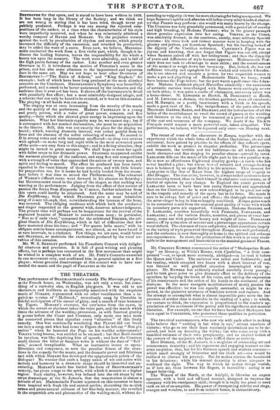THE THEATRES.
THE performance of BEAIIMARCHAIS'S comedy The Marriage of Figaro, at the French house, on Wednesday, was not only a treat, but some- thing of a curiosity also, to English playgoers. It was odd to see characters and incidents so inseparably associated with the exquisite music of MOZART, represented with no other vocalization than a In- gubricus version of " Malbrook," tremulously sung by Cherubin in doleful anticipation of his career of glory, and a snatch of tune hummed by Figaro. MOZART'S overture, the entr'actes from the opera, in which the cornet or clarionet takes the voice part, and the march which times the advance of the wedding-procession, as with funereal gravity it passes before the Count and Countess, only made one miss more the concerted pieces that signalize every "situation" of this lively comedy. One was continually wondering that PLESSY did not break out into a song, and what had come to Figaro that he left out "Non pia andrai " when he bantered the Page on his warlike achievements? VOLNYS being hoarse, was entitled to be excused ; but that Basil should be tuneless, was like depriving him of speech ; and how the Countess could dictate the billet or Susanne write it without the duet of "Sail' aria," seemed inexplicable. What an instructive lesson to opera- librettists and composers, to note the peculiar fitness of the situa- tions in the comedy for the music, and the dramatic power and felicitous tact with which MOZART has developed the epigrammatic points of the dialogue! No wonder that such a happy union of wit and satire with melody and harmony in a dramatic shape should be immortal and un- satiating. MOZART'S music has buried the form Of BEAUMARCHAIS'S comedy, but given wings to the spirit, with which it mounts to a higher region. Such vitality, however, was infused into the old shape by the corps dramatique at the St. James's, that the resurrection is almost a miracle of art. Mademoiselle PLESSY appeared on this occasion to have been inspired with fresh life and animal spirits ; discarding the modish seism" and preternatural stillness of her fine-lady manner, she revelled in the coquettish arts and pleasantries of the waiting-maid, without de- scending to vulgarity : it was the more charming for being unexpected. We hope Susanne's spirits and abandon will infect every other kindred charac- ter that FLOSSY may perform : she would win many hearts by the change. The Countess was very gracefully personated, with a genial air of suavity and high breeding, by Madame PERMON ; who in the graver passages threw genuine expression into her acting. VOLNY8, as the Count, was admirably dressed, in the cumbrous, stately, semi-military Spanish costume: his triste look and violent manner were in keeping with the gloomy and jealous, yet licentious Spaniard ; but his bearing lacked of the dignity of the Castilian nobleman. CARTIGNY'S Figaro was so joyous and knowing, that one forgot that Figaro was not old, except when Susanne paired off with her bridegroom ; and then the disparity of years and difference of style became apparent. Mademoiselle Fon- GEOT does not look to advantage in male attire ; and the consciousness of this seemed to weigh down her buoyancy. But, indeed, she has not sufficient vivacity and espicglerie for the wicked and volatile Cherubia: she is too shrewd and sensible a person for two coquettish women to make a pet and plaything of. Mademoiselle MERY, we fancy, would have become the Page better; but the part wants a performer like Ciiart- ZET. Madame LAMBERT played Marcelline admirably the succession of sarcastic curtsies interchanged with Susanne were cuttingly severe on both sides ; it was quite a duello of obeisances, and every salute was a home-thrust. M. LEMADRE SS Bartolo, 34. DORGEBRET as Basile, and M. LIENARD as Antonio, the drunken gardener, were all excellent ; and M. Benclur, as a portly functionary with a hitch in his speech, made a good deal of fun. The insignificance of the parts allotted to Messieurs GASTON, BAZIN, and DELMARY, and the introduction of all the ladies of the establishment to swell the crowd of guests at the wedding and listeners at the trial, may be instanced as a proof of the strength of the cast and resources of the company. We doubt if the Theatre Francais could muster a more powerful cast, taken altogether. The performance, we believe, will be repeated only once--on Monday next.


























 Previous page
Previous page